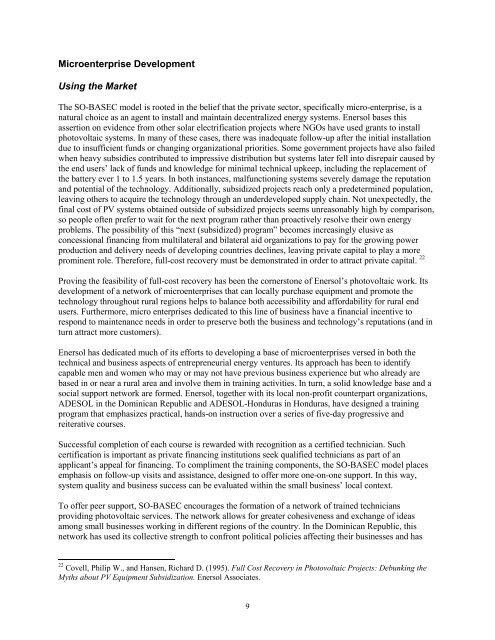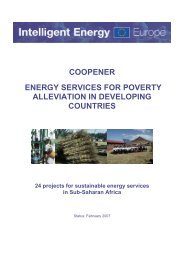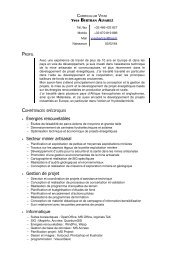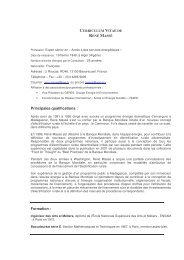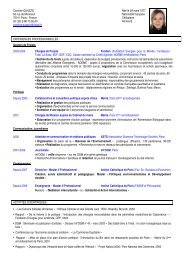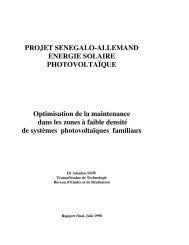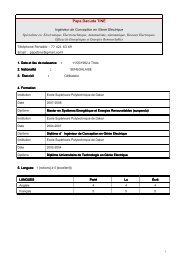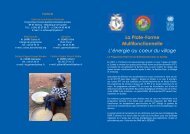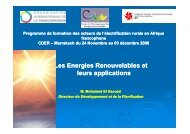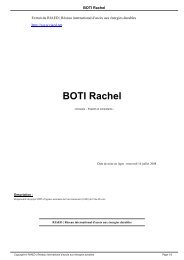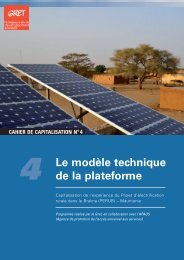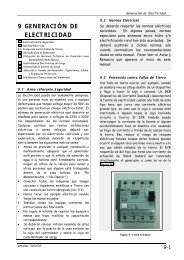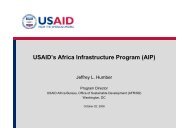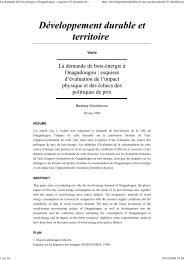Solar-Based Rural Electrification and Micro-Enterprise ... - NREL
Solar-Based Rural Electrification and Micro-Enterprise ... - NREL
Solar-Based Rural Electrification and Micro-Enterprise ... - NREL
You also want an ePaper? Increase the reach of your titles
YUMPU automatically turns print PDFs into web optimized ePapers that Google loves.
<strong>Micro</strong>enterprise DevelopmentUsing the MarketThe SO-BASEC model is rooted in the belief that the private sector, specifically micro-enterprise, is anatural choice as an agent to install <strong>and</strong> maintain decentralized energy systems. Enersol bases thisassertion on evidence from other solar electrification projects where NGOs have used grants to installphotovoltaic systems. In many of these cases, there was inadequate follow-up after the initial installationdue to insufficient funds or changing organizational priorities. Some government projects have also failedwhen heavy subsidies contributed to impressive distribution but systems later fell into disrepair caused bythe end users’ lack of funds <strong>and</strong> knowledge for minimal technical upkeep, including the replacement ofthe battery ever 1 to 1.5 years. In both instances, malfunctioning systems severely damage the reputation<strong>and</strong> potential of the technology. Additionally, subsidized projects reach only a predetermined population,leaving others to acquire the technology through an underdeveloped supply chain. Not unexpectedly, thefinal cost of PV systems obtained outside of subsidized projects seems unreasonably high by comparison,so people often prefer to wait for the next program rather than proactively resolve their own energyproblems. The possibility of this “next (subsidized) program” becomes increasingly elusive asconcessional financing from multilateral <strong>and</strong> bilateral aid organizations to pay for the growing powerproduction <strong>and</strong> delivery needs of developing countries declines, leaving private capital to play a moreprominent role. Therefore, full-cost recovery must be demonstrated in order to attract private capital. 22Proving the feasibility of full-cost recovery has been the cornerstone of Enersol’s photovoltaic work. Itsdevelopment of a network of microenterprises that can locally purchase equipment <strong>and</strong> promote thetechnology throughout rural regions helps to balance both accessibility <strong>and</strong> affordability for rural endusers. Furthermore, micro enterprises dedicated to this line of business have a financial incentive torespond to maintenance needs in order to preserve both the business <strong>and</strong> technology’s reputations (<strong>and</strong> inturn attract more customers).Enersol has dedicated much of its efforts to developing a base of microenterprises versed in both thetechnical <strong>and</strong> business aspects of entrepreneurial energy ventures. Its approach has been to identifycapable men <strong>and</strong> women who may or may not have previous business experience but who already arebased in or near a rural area <strong>and</strong> involve them in training activities. In turn, a solid knowledge base <strong>and</strong> asocial support network are formed. Enersol, together with its local non-profit counterpart organizations,ADESOL in the Dominican Republic <strong>and</strong> ADESOL-Honduras in Honduras, have designed a trainingprogram that emphasizes practical, h<strong>and</strong>s-on instruction over a series of five-day progressive <strong>and</strong>reiterative courses.Successful completion of each course is rewarded with recognition as a certified technician. Suchcertification is important as private financing institutions seek qualified technicians as part of anapplicant’s appeal for financing. To compliment the training components, the SO-BASEC model placesemphasis on follow-up visits <strong>and</strong> assistance, designed to offer more one-on-one support. In this way,system quality <strong>and</strong> business success can be evaluated within the small business’ local context.To offer peer support, SO-BASEC encourages the formation of a network of trained techniciansproviding photovoltaic services. The network allows for greater cohesiveness <strong>and</strong> exchange of ideasamong small businesses working in different regions of the country. In the Dominican Republic, thisnetwork has used its collective strength to confront political policies affecting their businesses <strong>and</strong> has22 Covell, Philip W., <strong>and</strong> Hansen, Richard D. (1995). Full Cost Recovery in Photovoltaic Projects: Debunking theMyths about PV Equipment Subsidization. Enersol Associates.9


